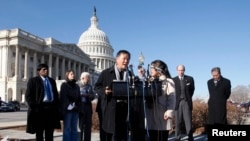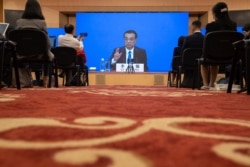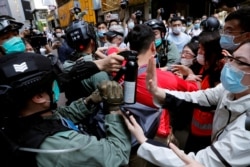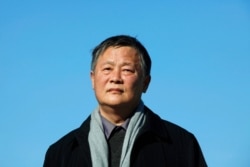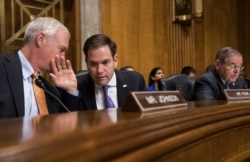Legislators from eight countries and the European Parliament have launched an international platform to counter what they see as the "greatest challenge to the free world" — namely, China’s behavior under the leadership of its Communist Party.
"The group exists to allow parliamentarians who represent the people to make clear to their governments that a more robust response is necessary," Inter-Parliamentary Alliance on China (IPAC) spokesperson Sam Armstrong told VOA in a phone interview from London.
The group introduced itself to the world on Thursday with a two-minute video featuring lawmakers from Australia, Canada, Germany, Japan, Norway, Sweden, Britain, the United States and the European Parliament. The online mission statement generated more than 300,000 views in less than 24 hours and attracted a new national delegation from Lithuania.
On the video, members of the group took turns reading aloud from the statement, which calls for a coordinated and coherent response to China’s behavior in the world.
“It is a challenge which touches all of us,” said Michael Brand of the German Bundestag.
“What we once believed about China’s rise no longer corresponds to reality,” said Shiori Yamao, a legislator from Japan.
“We thought China would open up over time. This hasn’t happened,” said Elisabet Lann of Sweden.
John McKay, a member of Canada’s parliament, said, “The world wants and needs China, a country of profound tradition, culture, and industry,” but, according to the group’s mission statement, the government in Beijing has instituted more authoritarian rule at home while “repeatedly and explicitly stat[ing] its intention to expand its global influence.”
Armstrong said the idea of establishing a platform spanning party and national lines began about six weeks before Thursday’s declaration and was prompted by Beijing’s response to the coronavirus outbreak, the initial cover-up and subsequent crackdown on citizens critical of how the government responded to the outbreak, as well as a proposed new security law for Hong Kong.
Armstrong said legislators from any other democratic country are welcome to join the group as long as their delegation is chaired by a representative from each of the major parties in that country.
The group is being advised on human rights in China by Wei Jingsheng, who spent nearly two decades as a political prisoner in China before being allowed to travel to exile in the United States in 1997.
“We have been hoping to form such a cross-country alliance for a long time,” Wei told VOA on Friday, recalling his discussions more than 10 years ago with California Democrat Nancy Pelosi — now speaker of the House of Representatives — and Congressman Chris Smith, the New Jersey Republican.
Wei said he believes the new alliance will strengthen voices in support of China’s democratization. “This alliance is important in particular because Beijing has shown its capability to gather support around itself, often by bribery, in international forums and push its own narrative.”
June Teufel Dreyer, a political scientist and longtime China watcher who teaches at the University of Miami, said the organization has the potential to be effective “in theory.”
“But impact can come only if the governments of their countries take concrete measures to make the party government of the PRC observe international rules,” she said, using the initialism for the People’s Republic of China. “So far, they have been all too willing to bleat feeble protests while eagerly soliciting trade with China, while pundits in their countries caution that any actions ‘will hurt us more than China.’ ”
The co-chairs of the American delegation to the alliance are Senator Bob Menendez of New Jersey, the most senior Democrat on the Senate Foreign Relations Committee, and Senator Marco Rubio of Florida.
Rubio, a Republican, issued a statement stressing the importance of what the group is hoping to achieve. "How we respond to the People’s Republic of China and the Communist Party’s attempt to reshape the globe is the defining foreign policy question of our time,” he said.
Menendez said he is looking forward to making “concrete progress on critical issues presented by Beijing, grounded on the respect and promotion of universal human rights.”
